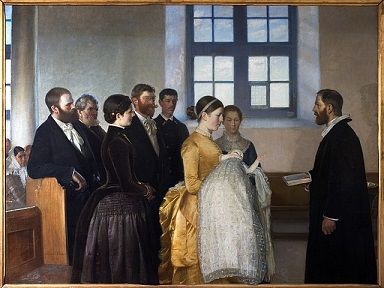It is tempting to speculate whether the successful Danish TV series ‘Herrens Veje’, with its charismatic lead Lars Mikkelsen playing a troubled parish priest, is having a knock-on effect.
Whichever way you look at it, figures released by the church ministry reveal a slight increase in the number of people being baptised into the Danish state church Folkekirken.
In 2018 a total of 41,601 went through the ceremony compared to 41,015 in 2017.
Foreigners skewing the figures
As far as membership of the state church goes, the figure is 74.7 percent – a slight fall compared to 2017 where 75.3 percent of Danes were members. This trend can be partly explained by an increasing number of people coming to live in Denmark who come from other backgrounds and faiths.
READ ALSO: Danish state church still haemorrhaging members – but more slowly
“I’m glad that a very high proportion of the population feel such great loyalty and connection to the Folkekirken. It’s not so surprising that numbers are falling – in a globalised world, Denmark has acquired many citizens who belong to other faiths and naturally won’t become members of the state church,” said church minister Mette Bock.
Wedding bells and death knells
As well as the number of baptisms being on the rise, the statistics also reveal that weddings and blessings in church also increased slightly. In 2017 there were 10,381 weddings and this rose to 10,698 in 2018. The figure for blessings was 1,471 in 2018 compared to 1,332 in 2017.
Regarding the great leveller – death – last year, 45,324 of all funerals (or 82.6 percent) took place from a church. A further 15.7 percent were without the church’s involvement and 1.6 percent took place according to the rites of other religions.















